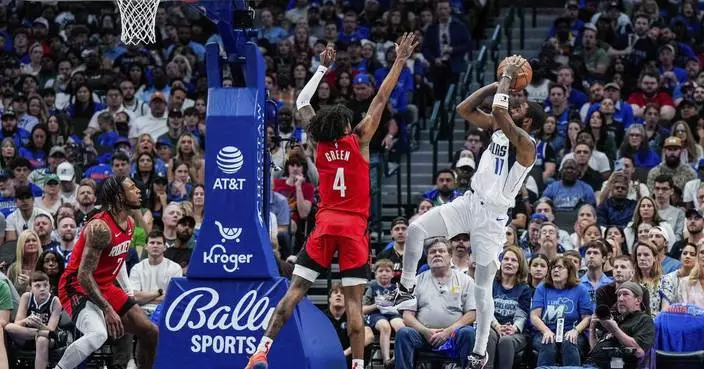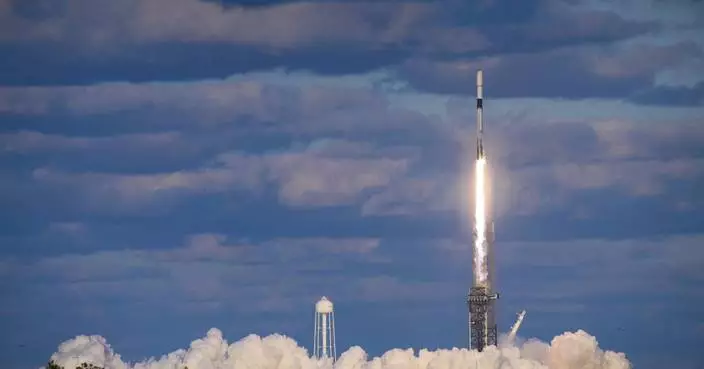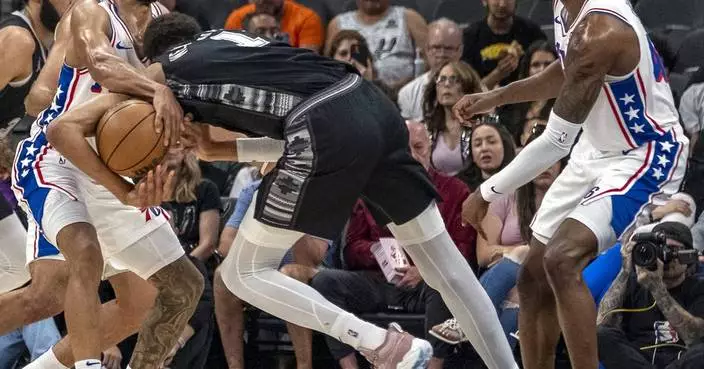New CIA Director Gina Haspel pledged to send more spies into the field during her swearing-in Monday as President Donald Trump offered up praise for the rank-and-file, who felt snubbed during his first visit to the headquarters of the premier U.S. intelligence agency.
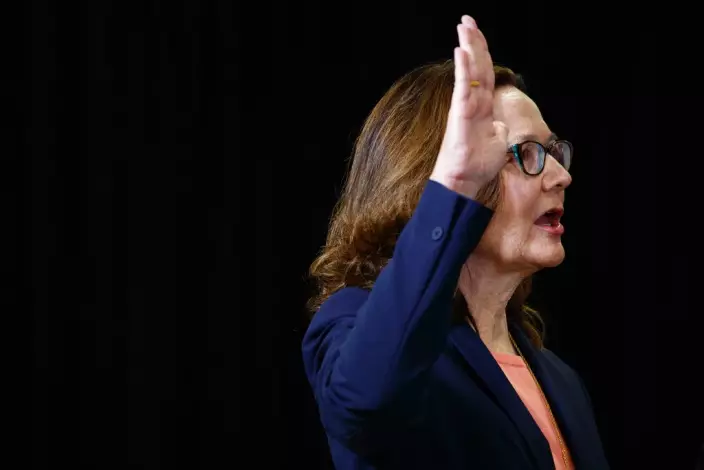
Incoming Central Intelligence Agency director Gina Haspel participates in a swearing-in ceremony at CIA Headquarters, Monday, May 21, 2018, in Langley, Va. (AP Photo/Evan Vucci)
"We must learn from the past, but we cannot dwell in the past," said Haspel, whose ascent from undercover operative to the top job was challenged because of her role in a program to harshly detain and interrogate terror suspects after 9/11.
"We must constantly learn, adjust, improve and strive to be better. We demand it of ourselves and America deserves nothing less," she said, drawing loud applause from her co-workers assembled inside the headquarters at Langley, in northern Virginia.
Haspel, 61, succeeds Mike Pompeo, whom Trump tapped to become secretary of state. Pompeo was present at the swearing-in and the oath was administered by Vice President Mike Pence.
Critics have said Haspel's role in the non-banned program should have disqualified her from becoming CIA director, although she has vowed not to restart it. Her supporters cited her three decades of experience at the spy agency both domestically and at many posts abroad.
Haspel, who has spent 33 years with the CIA, pledged to boost foreign language proficiency, strengthen the CIA's partnerships with intelligence agencies in the U.S. and abroad and deploy more officers to the field. She said the CIA also needed to focus on strategic threats to U.S. national security as well as the ongoing one from global terrorism.
As the first female CIA director, Haspel said she was indebted to female intelligence officers who blazed the trail for women in the field. "I stand on the shoulders of heroines who never sought public acclaim, but served as inspirations to the generations that came after them," she said.
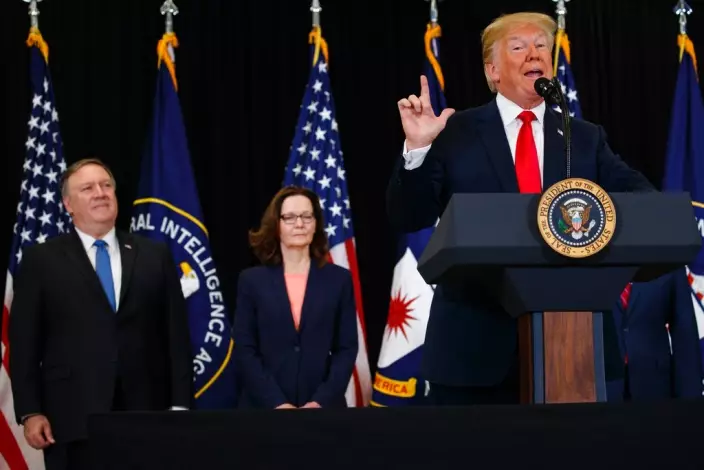
Secretary of State Mike Pompeo, left, and incoming Central Intelligence Agency director Gina Haspel, center, listen to President Donald Trump speak during a swearing-in ceremony at CIA Headquarters, Monday, May 21, 2018, in Langley, Va. (AP Photo/Evan Vucci)
She also referenced her rocky confirmation during which lawmakers had called for her mostly classified past career to be open to public scrutiny.
"It has been nearly 50 years since an operations officer rose up through the ranks to become the director, and after the experience of the last two months, I think I know why that is," Haspel joked.
Trump said she showed courage during the Senate confirmation process in the face of "very negative politics."
The president struck a different tone than on his previous visit to CIA headquarters. He hailed the agency rank-and-file, calling them the "most elite intelligence professionals on the planet" and promised them the "the tools, the resources and the support they need."
When Trump visited the CIA headquarters in January 2017, one day after taking office, it was on the back of his repeated criticisms of the U.S. intelligence community over its conclusion that Russian had interfered in the presidential election.
That day, many of his remarks were focused on settling scores with the media. His comments raised the ire of former intelligence officials because he spoke in front of a wall marked with stars representing fallen CIA officers, which was viewed as disrespectful.
This year, he paid tribute to the lost lives, saying "their stories of service and sacrifice and daring will live for all time."
Only hours before Trump visited CIA headquarters, he was promoting criticism of former CIA Director John Brennan. He suggested Brennan was to blame for the investigation into possible collusion between the Trump campaign and Russia.
On Twitter, Trump referenced comments from conservative commentator Dan Bongino on "Fox and Friends," which argued that Brennan "started this entire debacle." Bongino, a former Secret Service agent, also said Brennan had "disgraced the intelligence community."
Brennan became the agency's director in 2013 under President Barack Obama and served until January 2017. He has been a vocal critic of Trump.
On Sunday, Brennan warned Senate Majority Leader Mitch McConnell and House Speaker Paul Ryan, tweeting: "If Mr. Trump continues along this disastrous path, you will bear major responsibility for the harm done to our democracy. You do a great disservice to our Nation & the Republican Party if you continue to enable Mr. Trump's self-serving actions."
MIAMI (AP) — A former career U.S. diplomat was sentenced Friday to 15 years in federal prison after admitting he worked for decades as a secret agent for communist Cuba, a plea agreement that leaves many unanswered questions about a betrayal that stunned the U.S. foreign service.
Manuel Rocha, 73, will also pay a $500,000 fine and cooperate with authorities after pleading guilty to conspiring to act as an agent of a foreign government. In exchange, prosecutors dismissed more than a dozen other counts, including wire fraud and making false statements.
“Your actions were a direct attack to our democracy and the safety of our citizens,” U.S. District Court Judge Beth Bloom told Rocha.
Rocha, dressed in a beige jail uniform, asked his friends and family for forgiveness. “I take full responsibility and accept the penalty," he said.
The sentencing capped an exceptionally swift criminal case and averted a trial that would have shed new light on what, exactly, Rocha did to help Cuba even as he worked for two decades for the U.S. State Department.
Prosecutors said those details remain classified and would not even tell Bloom when the government determined Rocha was spying for Cuba.
Federal authorities have been conducting a confidential damage assessment that could take years to complete. The State Department said Friday it would continue working with the intelligence community “to fully assess the foreign policy and national security implications of these charges.”
Rocha's sentence came less than six months after his shocking arrest at his Miami home on allegations he engaged in “clandestine activity” on Cuba’s behalf since at least 1981, the year he joined the U.S. foreign service.
The case underscored the sophistication of Cuba’s intelligence services, which have managed other damaging penetrations into high levels of U.S. government. Rocha's double-crossing went undetected for years, prosecutors said, as the Ivy League-educated diplomat secretly met with Cuban operatives and provided false information to U.S. officials about his contacts.
But a recent Associated Press investigation found red flags overlooked along the way, including a warning that one longtime CIA operative received nearly two decades ago that Rocha was working as a double agent. Separate intelligence revealed the CIA had been aware as early as 1987 that Cuban leader Fidel Castro had a “super mole” burrowed deep inside the U.S. government, and some officials suspected it could have been Rocha, the AP reported.
Rocha's prestigious career included stints as ambassador to Bolivia and top posts in Argentina, Mexico, the White House and the U.S. Interests Section in Havana.
In 1973, the year he graduated from Yale, Rocha traveled to Chile, where prosecutors say he became a “great friend” of Cuba’s intelligence agency, the General Directorate of Intelligence, or DGI.
Rocha's post-government career included time as a special adviser to the commander of the U.S. Southern Command and, more recently, as a tough-talking Donald Trump supporter and Cuba hardliner, a persona that friends and prosecutors said Rocha adopted to hide his true allegiances.
Among the unanswered questions is what prompted the FBI to open its investigation into Rocha so many years after he retired from the foreign service.
Rocha incriminated himself in a series of secretly recorded conversations with an undercover agent posing as a Cuban intelligence operative. The agent initially reached out to Rocha on WhatsApp, calling himself “Miguel” and saying he had a message “from your friends in Havana.”
Rocha praised Castro as “Comandante" in the conversations, branded the U.S. the “enemy” and boasted about his service for more than 40 years as a Cuban mole in the heart of U.S. foreign policy circles, prosecutors said in court records.
“What we have done … it’s enormous … more than a Grand Slam,” Rocha was quoted as saying.
Even before Friday's sentencing, the plea agreement drew criticism in Miami's Cuban exile community, with some legal observers worrying Rocha would be treated too leniently.
“Any sentence that allows him to see the light of day again would not be justice,” said Carlos Trujillo, a Miami attorney who served as U.S. Ambassador to the Organization of American States during the Trump administration. “He’s a spy for a foreign adversary who put American lives at risk.”
“As a Cuban I cannot forgive him,” added Isel Rodriguez, a 55-year-old Cuban-American woman who stood outside the federal courthouse Friday with a group of demonstrators waving American flags. “I feel completely betrayed.”
Mustian reported from Natchitoches, Louisiana.
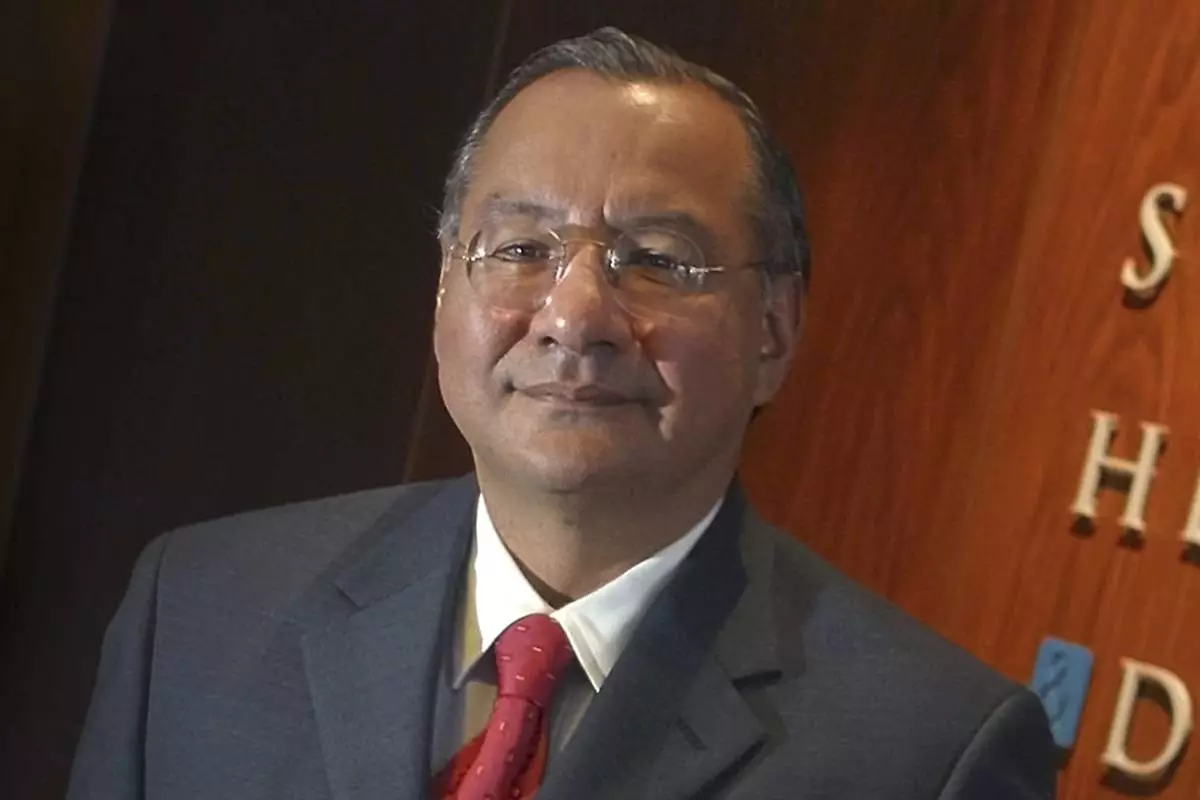
FILE - Manuel Rocha stands for a portrait at Steel Hector & Davis in Miami in January 2003, joining the firm to help open doors in Latin America. Former career U.S. diplomat Rocha was sentenced Friday, April 12, 2024, to 15 years in federal prison after admitting he worked for decades as a secret agent for communist Cuba, a plea agreement that leaves many unanswered questions about a betrayal that stunned the U.S. foreign service. (Raul Rubiera/Miami Herald via AP, File)







